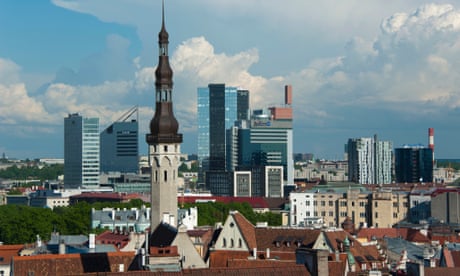Jay Doubleyou: brexit and history
here's a suggestion:
 A Brexit bolthole? For €100 you can become an e-resident of an EU country you've never visited
A Brexit bolthole? For €100 you can become an e-resident of an EU country you've never visitedEstonia claims the Panama Papers and British vote to leave the EU have boosted its recruitment drive for digital residents
Welcome to Estonia – your new home, even if only in name. Photograph: Getty Images
Maeve Shearlaw in Tallinn @maeveshearlaw
Thursday 15 September 2016 07.00 BSTLast modified on Thursday 15 September 201610.49 BST
Comments683

Estonia offers e-residency to foreigners
There’s a short application form, a €100 (£84) fee, and with a few clicks of a button you could be a digital resident of a country you’ve never set foot in.
Estonia’s e-residency initiative – offering foreigners the chance to base their business and finances digitally in the tiny Baltic state – is proving as easy as it is popular.
With just 1.3 million citizens Estonia is a small country. Of that number only 650,000 citizens are of working age, a figure expected to plummet in the next decade due to an ageing population and emigration.
And while e-residents are not citizens, the government believes they can contribute to the economy by using Estonian banks and establishing Estonian companies. They are also keen promote the country’s reputation as a digital pioneer.
“Attracting immigrants is just not an option for us. People would rather choose Sweden or Norway,” explained Taavi Kotka, Estonia’s chief information officer and government lead on the project. “Physically, we’re not able to improve our population. So why not do it online?”
With 12,000 digital citizens enrolled there is a lot to do to meet the 10 million target, but Kotka says he would prefer to judge success on business registrations. “We have added 1,000 businesses to the 60,000 that were already here – a 2% increase, which for us is important,” he said.
 Becoming a resident
Becoming a residentFacebookTwitterPinterest Signing up is easy, but what’s the point? Photograph: e-estonia.com
For anyone who has ever tried to get a 24-hour replacement passport or a Russian visa, the process is almost disconcertingly easy.
You fill in a short form, scan your passport and a photo and add a few throwaway lines about why you would like to become an e-resident. The last part is not subject to much scrutiny. “It’s fine to just say you are a fan of the process,” said Kaspar Korjus, managing director of the e-residency programme.
The application is sent off to be reviewed by the Estonian police, mainly for any financial discrepancies. If you have been involved in “dirty business” or money laundering you are likely to be rejected, said Korjus, speaking from the trendy confines of the e-residency showroom in Tallinn.
All being well, three months later you will get an invite to an Estonian embassy, or a pickup point in Tallinn, for a short interview and to be issued with your ID card.
The post-Panama Papers effect?
FacebookTwitterPinterest Base your business off the Baltic coast, not the Caribbean. Photograph: Dan Chung for the Guardian
The people behind the e-residency programme say they have seen an increase in interest after the Panama Papers scandal highlighted the need for greater transparency in offshore business and uncertainty after the UK referendum left companies scrambling for options to still be able to trade in euros.
If housing your business in a waterfront city thousands of miles away reminds you of anything, it could be the offshore tax arrangements of the global elite exposed in the Panama Papers leak this year.
The Estonians are keen to stress a major point of difference – that new e-residents will have their financial footprint monitored by the government digitally, not hidden in a warren of complicated legal arrangements.
Korjus believes the fallout from the scandal presents an opportunity for the programme. “Transparency is now a badge of honour and there are countries like India, Indonesia and Thailand where the most important thing as an entrepreneur is to be trusted,” he said.
Registering an Estonian business is also “useful for internet entrepreneurs in emerging markets who don’t have access to an online payment provider”, and for startups from countries such as Ukraine or Belarus, which suffer financial limitations from their governments.
And unlike the offshore arrangement exposed by the Panama leak, you are not exempt from paying taxes in your home country unless the majority of your business is done in Estonia. “If you are in the UK, your taxes should still be paid there … You don’t use our infrastructure, you use theirs. So pay for that,” said Kotka.
 The Brexit effect?
The Brexit effect?FacebookTwitterPinterest Kaspar Korjus shows off his ID card. Photograph: Tõnu Tunnel/e-stonia.com
Another major news event that organisers claim has given the e-residency programme a boost is the British vote to leave the European Union.
Advertisement
In the uncertainty in the two weeks that followed the vote, applications for residency from the UK grew tenfold, although there are still only 616 peoplefrom Britain registered as digital citizens. .
“Most of the interest was speculative … businesses assuring their shareholders that they would still be able to pay salaries in euros,” said Korjus, who was unable to put a figure on how much money such businesses would pump into Estonia’s economy.
Korjus estimated that 60% who had registered interest in the programme had done so for business purposes. The rest were just general supporters of the idea.
E-residency is self-funded, with the costs coming from people who register. It originally cost €50 but the team doubled the price in February to fund upgrades to the application process.
The Estonian government supports e-residency as a policy and remains in constant dialogue with Korjus’s team about how to improve conditions for the digital citizens. Allowing them to open bank accounts from outside the country was probably the most significant change yet, Korjus said.
But governments change and Korjus admitted there was a risk that a new administration could cut the apron strings, leaving the new recruits digitally stateless.
“I need to prove we should keep doing this,” he said, adding that he had spent the past few days talking to Estonia’s presidential hopefuls. “But the Estonian public are on board and that’s the first hurdle.”
A Brexit bolthole? For €100 you can become an e-resident of an EU country you've never visited | World news | The Guardian
.
.
.

No comments:
Post a Comment